Зарубежные литературы. Рубрика в журнале - Новый филологический вестник

Поэтика патафизики Альфреда Жарри
Статья научная
В статье рассматривается художественный метод французского писателя А. Жарри - великого экспериментатора, мастера языковой игры, создателя теории «патафизики» и новой модели театрального искусства. В теории «патафизики» заложен игровой подход к условности, схематичности литературных топосов. Основной тезис «патафизики» - «исключение есть правило» - парадокс, разрушающий стереотипы обыденного сознания. Стилевую доминату драматургии А. Жарри составляет утрированное, ироническое пародирование всей предшествующей и современной культуры. Как показывает автор статьи, «патафизика» А. Жарри вскрывает условный характер театрального действия, утверждает универсальность актерской пластики, поэтику кукольного театра, вводит принцип очуждения, разрушающий иллюзию правдоподобия. Жарри стремился заставить зрителя мыслить, а не сопереживать. Поэтика театра марионеток разрушала психологические и социальные характеристики. Условность персонажа подчеркивалась идеей создания абстрактного образа или «марширующей абстракции» (abstraction qui marche). Доминантой художественного языка становится гротеск, эпатирующий зрителя. Инновационные, «маргинальные» идеи Жарри изменили соотношение явлений в литературном процессе. Теория «патафизики» определяется стилистикой контрастов, смешением противоположностей, сосуществующих на равных правах: бытийный и бытовой, комический и трагический, фантастический и реальный. Рецепция этой теории реализуется на уровне языка, в котором слово многозначно, полисемично, эластично. В знаменитой пьесе «Король Убю» гротескный образ злого, трусливого Убю стал символическим воплощением типологии социальных закономерностей XX в., а из его «громадного брюха» родился весь европейский театр авангарда - от сюрреализма до С. Беккета и Э. Ионеско.
Бесплатно
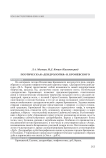
Поэтическая «дендрология» В. Броневского
Статья научная
На материале поэзии Владислава Броневского исследуется роль дендрообразов в создании мифопоэтической картины мира. «Дендрологический ракурс» (В.А. Хорев) представляет собой возможность новой интерпретации творчества, казалось бы, достаточно полно изученного поэта. Поэтическая «дендрология» Броневского позволяет продемонстрировать генетические связи и типологические сближения творчества польского поэта с русской литературой, прежде всего, с поэзией Сергея Есенина. Броневский усматривал «мистицизм» в поэзии Есенина, и это не до конца осознанное «мистическое» начало свойственно «дендрологической» лирике Броневского. Художественно отражая славянские архаические представления о природе и следуя есенинской традиции, Броневский был создателем «древесного» мифа, в котором центральная роль отводится дубу, основному мужскому «персонажу» в мире деревьев, и березе – носительнице женского (девичьего) начала. В стихотворениях о березе и дубе у Броневского присутствуют есенинские аллюзии, но есть и специфика соответствующих дендрообразов. Береза у Броневского более тесно, чем у Есенина, связана с загробным миром. Особенно это проявляется в послевоенной поэзии Броневского, в том числе в стихотворном цикле «Анка», посвященном памяти безвременно ушедшей дочери поэта. Поэтическая мифология «чувствующего» древа» сконцентрирована Броневским в стихотворении «Дуб». Дендрообраз дуба биографически связан с родным городом Броневского Плоцком. У Броневского происходит мифопоэтическое «сращение» образов дуба и лирического «я» поэта («Это я – дуб!»).
Бесплатно

Проблема идентичности в романе Июнь Ли "Добрее одиночества": нарратологический аспект
Статья научная
Проблема идентичности неоднократно привлекала внимание философов (П. Рикер) и психологов (Дж. Брунер, Д.П. Макадамс, К. Маклин, В. Данлоп). В статье предпринимается попытка исследовать репрезентации данного феномена в художественном тексте. В качестве предмета исследования выступает не удостоенный пока вниманием литературоведов роман современной американской писательницы китайского происхождения Июнь Ли «Добрее одиночества». В произведении постулируется принципиально повествовательный характер идентичности: герои уподобляют жизнь совокупности историй, где каждому отведена определенная роль. Подобная «нарративизация» реальности позволяет персонажам упростить взаимоотношения с близкими, придать смысл своему существованию. Вместе с тем искусственность такого рода построений рано или поздно себя обнаруживает: мотивы игры, самообмана, иллюзии выходят на передний план. Июнь Ли подчеркивает экзистенциальную функцию «автонарративов». Они страхуют героя от непосредственной встречи с собственным «эго», а возможно, его отсутствием. По мнению когнитивистов, «я» человека - это «мираж», сформированный множеством автобиографических сюжетов. Персонажи романа не столь категорично трактуют природу человеческой самости, но признают вынужденную необходимость поддерживающих (оберегающих) ее историй (несмотря на их очевидное несовершенство). Высказанные в статье соображения могут оказаться полезными в изучении других текстов, затрагивающих тот круг философских и социально-психологических проблем, которые явились отправной точкой для настоящей работы.
Бесплатно

Происхождение "Язычества" Рикарду Рейша - самого загадочного гетеронима Фернандо Пессоа
Статья научная
Статья раскрывает суть и значение нового португальского или трансцендентального язычества, положенного Фернандо Пессоа в основу творчества его самого малоизученного и самого загадочного гетеронима - Рикарду Рейша. В первой части статьи раскрывается происхождение этого гетеронима, черты его биографии, роднящие Рейша с его творцом. Освещены особенности его своеобразного поэтического слога, наполненного лексическими архаизмами, латинизмами и даже эллинизмами, повторяющимся использованием вычурных фигур речи (гипербатона, эллипсиса, умолчания, оксюморона и др.), намеренно латинизированный слог, перевернутый или искаженный порядок слов, который усиливает впечатление от его поэтической речи, придает ей благородство и возвышенность, но вместе с тем и холод, искусственную отстраненность от читателя, в связи с чем его тексты долгое время не были поняты и признаны критиками. Раскрывается своеобразная метрика, перекликающаяся с атичными моделями, но вовсе им не следующая слепо, являющаяся по своей сути своеобразным поэтическим экспериментом Рейша / Пессоа. Во второй части статьи раскрываются истоки «язычества» Рикарду Рейша, которые можно найти в следовании примеру Луиса Камоэнса (особенно его «Лузиадам»), в постоянном поиске альтернативы официальной христианской религии, в которой он был полностью разочарован, что привело его, в частности, к гностицизму, а именно к языческому гностицизму, выраженному в трудах герметиков. Еще одна причина обращения Пессоа / Рейша к язычеству: для него это - путь к свободе. Рейш - единственный гетероним Пессоа, в творчестве которого португальский гений нашел покой и внутреннюю свободу.
Бесплатно
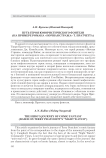
Путь героя юмористического фэнтези (на примере романа "Ночная стража" Т. Пратчетта)
Статья научная
В данной статье рассматривается путь героя юмористического фэнтези Терри Пратчетта с точки зрения его соответствия этапам мономифа, предложенным Дж. Кэмпбеллом. Несмотря на то, что герой романа «Ночная Стража», командор Ваймс, не является носителем особых сил и не выступает против «всемирного зла», он проходит те же классические этапы пути, которые характерны для эпического или героического фэнтези, наиболее близких мифам. В рассматриваемом романе герой проходит все три фазы пути мифологического героя: исход, инициация и возвращение, хотя порядок этапов внутри первой и второй фазы несколько изменены. Ваймс получает «сверхъестественное покровительство» лишь после перехода в потусторонний мир, так как отправился в путь по своей инициативе, встреча с богиней и женщиной-искусительницей носят буквальный характер, а функцию «отца» выполняет юный Сэм Ваймс. Воспроизведение матрицы пути культурного героя мифа в романе обусловлено самой мифологической основой фэнтези как жанра в целом. Однако герой юмористического фэнтези отличается большей десакрализацией, чем герои эпического фэнтези: он неидеален, совершает ошибки, подвергается соблазну, сомневается в правильности своих действий, тем самым сближаясь с обычным человеком. Это закономерно, поскольку универсум «Плоского мира» Терри Пратчетта изначально был задуман как отражение нашей действительности.
Бесплатно

Размышления об "американской мечте" в творчестве Айн Рэнд (на примере рассказа "Ее вторая карьера")
Статья научная
В статье идет речь о малоизвестном раннем рассказе американской писательницы русского происхождения Айн Рэнд (Алисы Розенбаум) «Ее вторая карьера» (Her Second Career, около 1929). Данный рассказ анализируется в контексте дискуссий об «американской мечте» как о важнейшем национальном конструкте США, главным выводом о котором будет его крайняя противоречивость, выразившаяся в кризисе антропологической модели, в которой идеал человека-творца оказался заменен на человека-потребителя. Изданный посмертно в редакции Л. Пейкоффа, рассказ представляет собой повествование о голливудской актрисе Клэр Нэш, которой английский сценарист Уинстон Эйерс предлагает пари: начать свою головокружительную карьеру заново. Сам же он тем временем обещает сделать звездой безвестную статистку Хедди Леланд. Через анализ деталей, воссоздающих в рассказе Голливуд 1920-х гг., обнаруживается первая проблема «американской мечты»: американское общество не настроено на поиск талантов, равнодушно, косно и не способно на изменения. Кроме того, даже несмотря на то, что в конце концов главной героине и удается сыграть в одном из «громких» фильмов (где главную роль сыграет та самая безвестная статистка, к которой Клэр Нэш относилась в начале рассказа с презрением), критики все равно расценят ее как посредственную актрису. Таким образом, становится понятна вторая проблема, связанная с «американской мечтой»: манипуляция массовым сознанием с помощью СМИ. В поздних произведениях Айн Рэнд наделяет своих главных героев качествами self-made man, казалось бы, следуя идеалу «американской мечты», где каждый может достигнуть успеха. Но в ходе анализа рассказа доказывается, что поздние герои писательницы обладают важным качеством, благодаря которому их успех не случаен - целостностью (integrity). Данное качество является ключевым компонентом, формирующим личную утопию писательницы, противопоставленную «американской мечте».
Бесплатно
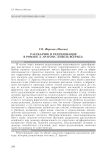
Рассказчик и редупликация в романе Л. Арагона "Гибель всерьез"
Статья научная
В статье через понятие редупликации анализируется трансформация рассказчика в ходе диегетически спроецированного акта чтения. Выбор термина «редупликация» вместо французского mise en abyme обосновывается строгостью понятия, представленного Л. Дэлленбахом как нарративная фигура аналогического удвоения на уровне истории или дискурса при наличии вставного фрагмента. Выбор романа «Гибель всерьез» Л. Арагона объясняется сочетанием двух видов удвоения: аналогия темы убийства между вставным рассказом «Эдип» и обрамлением (история) и проекция самого чтения рассказа (дискурс). До сих пор не изучено взаимодействие нарративных инстанций и вставного фрагмента при редупликации. В этой связи отмечается функциональность редупликации истории к выявлению меняющейся в ходе чтения позиции рассказчика-писателя, использующего «Эдипа» для рефлексии убийства. С целью выявить трансформацию рассказчика во взаимодействии со вставным фрагментом анализируется тема убийства на разных этапах рецепции. Делается вывод о том, что чтение «Эдипа» напоминает рассказчику о его писательской роли. Им формулируются отличия по отношению к обрамлению (убийство как письмо, совмещение писателя и убийцы), являющие собой новые смыслы и определяющие взаимодействие рассказчика с «Эдипом» как интерпретационное, копирующее функцию реального читателя. Интерпретационное смыслопорождение имеет также сюжетно-личностную функцию разрешения рассказчиком конфликта при помощи оформленного по прочтении метафорического восприятия убийства. Наконец рассказчик, объединяющий историю и дискурс, способствует сплетению двух видов редупликации, позволяя далее исследовать ее синтетически.
Бесплатно
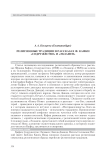
Религиозные традиции в рассказах Ф. Кафки «Содружество» и «Экзамен»
Статья научная
Статья посвящена исследованию религиозной образности в рассказах Франца Кафки «Содружество» (1920) и «Экзамен» (1920) как ключа к их толкованию. Опираясь на историко-культурный контекст создания произведений, а также на факты биография писателя, автор раскрывает сакральные смыслы, таящиеся за «темными» и лаконичными сюжетами, которые на протяжении десятилетий озадачивали историков литературы и биографов Кафки. Рассказ «Содружество» представляет собой размышление Кафки о Ветхом Завете и сионизме: в качестве действующих лиц аллегорического дискурса выступают пентаграмма (Печать Соломона) и гексаграмма (Звезда Давида), которые «оживают» и вступают в борьбу за статус символа еврейского народа. Звезда Давида, которая изо всех сил старается вытеснить Печать Соломона, символизирует угасание классической иудейской традиции и торжество сионизма. «Экзамен» изобилует аллюзиями на «Книгу Иова»: дознаватель в рассказе - это Бог, главный герой - праведник и пророк, которого Бог длительное время не призывал и с которым наконец-то вступил в диалог. «Несправедливость» Бога на поверку оказывается экзаменом - испытанием страданием. Произведение отражает внутренний конфликт писателя: чувствуя себя «провалившим экзамен» в жизни светской, Кафка размышляет о том, что значит «сдать экзамен» / «пройти испытание страданием» с религиозной точки зрения. Следовательно, «Экзамен» представляет собой модернистскую версию легенды об Иове, а решение экзистенциального кризиса, к которому подводит читателя Кафка, заключается в смирении.
Бесплатно
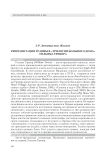
Репрезентация травмы в "Трилогии большого дома" Уильяма Тревора
Статья научная
Уильям Тревор (William Trevor) - англо-ирландский писатель, который в своих произведениях рассматривает «ирландский вопрос» с точки зрения так называемого класса англо-ирландского господства (Anglo-Irish Ascendency). К этой группе населения Ирландии относят английские семьи, которые были переселены на остров еще в XVII в., сохранили свои религию, традиции и до начала ХХ в. продолжали жить обособленно от ирландских жителей острова. Наиболее ярко этот вопрос в творчестве Уильяма Тревора представлен в так называемой «Трилогии Большого Дома» (Big House Trilogy). Данная трилогия включает в себя следующие романы: «Пасынки судьбы» (Fools of Fortune, 1983), «Тишина в саду» (The Silence in the Garden, 1988), «История Люси Голт» (The Story of Lucy Gault, 2002). Все три произведения относятся к жанру романа Большого Дома (Big House Novel) и посвящены травмирующей истории англо-ирландских отношений. Действие произведений происходит в уединенной усадьбе, где проживают английские семьи в окружении католического среднего класса. Историческим фоном во всех произведениях становится Первая мировая война, которая хотя и не является источником травмы, но привносит мотив насилия, связанный с локальным противостоянием. В каждом из трех романов происходит событие-катастрофа, которая становится отправной точкой для дальнейшего развития сюжета и является источником травмы персонажей. Герои как бы застревают в моменте катастрофы, постоянно переживая ее в своем сознании, отказываясь от будущего и обрекая себя на одиночество. «Застревания» в трилогии представлены, в первую очередь, через замкнутое пространство усадеб, а также через мотив повторения. Только героине последнего романа Люси Голт удается преодолеть травму, покидая свой дом, отказываясь от мести и прощая виновника своего одиночества.
Бесплатно
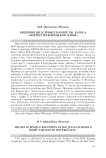
Рецепция belle epoque в книге Дж. Барнса "Портрет мужчины в красном"
Статья научная
Настоящая работа посвящена рассмотрению особенностей рецепции Belle Epoque в одной из последних книг Джулиана Барнса «Портрет мужчины в красном» (2019). Цель исследования - выявить и описать специфику образа Belle Epoque в книге Барнса, а также определить роль эстетических воззрений писателя в конструировании этого образа. Делается вывод о том, что в восприятии Барнса Belle Epoque - эпоха, отмеченная острыми противоречиями, в которой стремление сохранить старое сосуществует с тенденцией к разрушению норм, любовь к избыточности и разнообразию - с шовинизмом и закрытостью. Подчеркивается важность конфликта «старого и нового» как в социальной и политической жизни Франции (стремление сохранить институт аристократии, колониальные амбиции и общественный резонанс в связи с делом Дрейфуса), так и в искусстве рубежа эпох, где «старое» мыслится как интерес искусства к прошлому и экзотическому (декадентская проза, «Саламбо» Г. Флобера, картины Г. Моро), а «новое» - искусство модернизма, прежде всего импрессионизм и постимпрессионизм (К. Моне, Э. Дега), рассматривается Барнсом как истинный расцвет Belle Epoque. Показана особая значимость для Барнса двух типов героев эпохи - денди и эстета, представленных в книге образами литературного героя дез Эссента и его реального прототипа - графа Р. де Монтескью. Сделан вывод о критическом отношении писателя к «жизнетворчеству», его неприятии уподобления жизни искусству. Отмечено, что в системе персонажей книги денди и эстетам противопоставлен новый тип героя: свободный от предрассудков, открытый и деятельный, воплощенный в образе главного героя книги - докторе Поцци.
Бесплатно
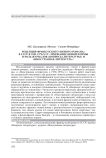
Статья научная
Исследование посвящено анализу критических статей о французском «новом романе», опубликованных в советских журналах «Вопросы литературы» и «Иностранная литература» в 1950-1970-е гг. Анализ работ советских исследователей показывает, как рецепция «нового романа» изменялась со временем, что зависело от трансформации культурно-исторического контекста, от преодоления штампов советского литературоведения сталинского периода, а также от развития литературы во Франции, предложившей более радикальные романные формы, оттенившие «новый роман». Рецепция романов также зависела от журнала, в котором публиковались статьи. В «Вопросах литературы», обращенных ко «внешнему» читателю и репрезентирующих официальную советскую критическую мысль, статьи полемичны, часто субъективны и схожи некоторыми чертами с памфлетами. В «Иностранной литературе» статьи направлены на «внутреннего» читателя; у них поясняющий, нейтральный тон, стремящийся вписать «новый роман» в историю французской литературы, тем самым утвердив его в правах. Легитимация новых романных форм происходит постепенно: исследователи ищут «зазор» в теориях «неороманистов», который позволит сравнить новый роман с реалистическим и соцреалистическим романом, тем самым сделав его менее маргинальным, более понятным: так, «ультрапсихологизм» Саррот превращается в бичевание мелкого буржуазного мира, а философский поиск Бютора - в столкновение единичного характера с «тленным западным миром».
Бесплатно

Речевые метафоры у Ч. Диккенса как способ интенсификации разноречия в романе "Домби и сын"
Статья научная
В статье анализируется функция метафоры в диалогах героев романа «Домби и сын». Делается попытка уточнить производимые метафорами эффекты, увидеть связь между стилистическим приемом и имманентными свойствами метафоры как речевой модели, опираясь на исследования М. Блэка и когнитивной теории. Как речевая модель, раскрывая ход мысли говорящего, во-первых, и выявляя взаимные представления говорящих друг о друге, во-вторых, метафора становится способом углубления речевой спецификации героя и выявления его возможностей осуществлять коммуникацию - говорить так, чтобы быть понятым, и понимать партнера в ответ. Метафора усложняет речь, поэтому описанный М.М. Бахтиным процесс непрерывной взаимоориентации языков, модусов, интонаций благодаря метафоре происходит интенсивнее. Для одного или даже для обоих героев метафора оказывается «чужим языком», барьером в коммуникации. Этот барьер герои преодолевают по-разному. В статье рассматриваются диалоги метафорами, которые ведут между собой три типа характеров, частых в диккенсовском романном обществе - душевные и чуткие герои, герои лицемерные и чудаки. Для первых метафора становится способом искреннего высказывания и распознавания друг в друге ментально и морально близких людей. Лицемеры прикрываются метафорами, заимствуют чужой дискурс и ведут с его помощью игру. В свою очередь, чудак, каким является Катль, хотя и использует формально метафорический язык, обнаруживает отсутствие языковой рефлексии в целом: невладение речью и делает героя странным. Морской язык Катля искусно присваивает Каркер, одерживая над капитаном верх и в речевом, и в сюжетно-драматическом плане. Роль стилистических приемов в интенсификации разноречия Диккенса отмечалась ранее, но в фокусе диалогов героев не рассматривалась.
Бесплатно

Статья научная
Целью авторов статьи является привлечение внимания к современной итальянской рождественской прозе и творчеству Дино Буццати (в его творческое наследие входят порядка тридцати рождественских произведений). В статье доказывается возрождение литературного жанра рождественского рассказа в итальянской литературе после падения фашизма и окончания Второй мировой войны. На материале произведений крупнейшего итальянского писателя ХХ в. авторы статьи подробно анализируют трансформацию жанра. Произведения исследуются с учетом литературного процесса, стремительного изменения исторической обстановки. В статье выявлена авторская интерпретация жанра рождественского рассказа, заключающаяся в соединении элементов фантастики и реализма в рамках одного произведения. Дино Буццати не только продолжает, но и новаторски развивает диккенсовские рождественские традиции. В его рассказах выделяются темы, ставшие к этому времени традиционными для жанра, однако, как показывают авторы статьи, актуализируются и модернизируются, переносятся в современность именно диккенсовские образы, поднимаются проблемы современного общества. Таким образом, Рождество в творчестве Дино Буццати и других писателей представляется «зеркалом» мира, который находится в непрерывном развитии, поэтому дальнейший сопоставительный анализ особенностей жанра современного итальянского рождественского рассказа в творчестве других авторов является перспективным направлением для исследования.
Бесплатно

Роман Г. Грасса "Жестяной барабан": проблема типологии героя
Статья научная
В статье рассматривается вопрос о типологии героя в романе немецкого писателя Г. Грасса «Жестяной барабан». В качестве двух доминирующих традиций, оказавших влияние на концепцию героя в этом произведении, автор статьи называет роман о художнике и плутовской роман. В статье определяются основные жанрообразующие черты этих жанров. В случае «романа о художнике» выделяются тенденция к саморефлексии, размышления об искусстве, присутствие оппозиции между бюргерским миром и миром творчества, при этом отмечено, что не все эти особенности релевантны для Г. Грасса. Работа сфокусирована на исследовании одной из кардинальных характеристик грассовского героя - оппозиции между художником и бюргерским миром, актуальной для литературы позднего романтизма (Э.Т.А. Гофман). Автор показывает, что мотив «ухода» восходит к литературе романтизма, мотив маски, встречающийся в романе, - к литературе барокко. О главном герое можно говорить как об «аутсайдере». Однако Оскар, предпринявший этот «уход», продолжает жить в бюргерском мире, который и становится, главным образом, предметом его записок, как и история Германии нацистского периода. Повествование Оскара имеет форму воспоминания, исключающего саморефлексию и философию искусства. Автор статьи указывает и на модификацию основных черт жанра героя-плута. В статье исследуется проблема развития героя, показаны основные вехи изменения его отношения к миру «больших». Роман Грасса интерпретируется автором статьи как произведение, испытавшее влияние философии экзистенциализма.
Бесплатно
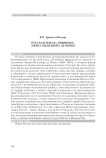
Русская тема в «Дневнике» Эжена-Мельхиора де Вогюэ
Статья научная
В статье впервые в российском литературоведении дан анализ не переводившегося на русский язык «Дневника» французского писателя и дипломата Эжена-Мельхиора де Вогюэ (1848-1910), в котором нашли отражение его первые впечатления от встречи с Россией. В статье «Дневник» Вогюэ рассматривается как пролог к многочисленным произведениям писателя на русскую тему, выявлены темы, мотивы, образы, которые в «Дневнике» только зарождались и впоследствии нашли продолжение и развитие в творчестве писателя, прежде всего в его знаменитой книге «Русский роман» (1886). Прослежена эволюция отношения Вогюэ к России, зарождение замысла «Русского романа». Отмечается особый интерес писателя к настроениям русского общества, его реакции на важные события общественно-политической жизни, к теме нигилизма и политического террора в России, а также к русской литературе и ее представителям (И.С. Тургеневу, Л.Н. Толстому, Ф.М. Достоевскому). Выявлены факторы, повлиявшие на его восприятие России: его дипломатический статус, политические взгляды, а также знакомство с русской литературой и тесные личные, семейные узы, связывавшие его с нашей страной. В статье оптика Вогюэ соотнесена с представлениями о России его предшественника А. де Кюстина. Отмечается, что, как и Кюстин, Вогюэ выстраивает оппозицию Россия / Запад. Однако, в отличие от Кюстина, Россия выступает в этой оппозиции в качестве позитивного члена. В статье сделан вывод о том, что идиллическим пространством покоя и творческого труда в «Дневнике» становится Боброво, имение супруги Вогюэ в Малороссии.
Бесплатно
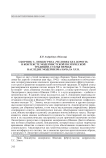
Статья научная
Цикл из двух статей посвящен поэтике сборника Эрика Линдегрена «человек без дороги» («mannen utan väg», 1942) – неисследованного в отечественном литературоведении ключевого произведения шведского фёртиутализма – и его роли в развитии модернистской поэтической традиции. В первой статье рассматривается влияние поэзии начала XX в. на творчество Э. Линдегрена, во второй – роль сборника «человек без дороги», а также критических статей Линдегрена в дискуссии в Швеции 1940-х гг. о сути модернизма – «дебатах о непонятности». В данной статье исследуется, как Э. Линдегрен переосмысляет предшествующую поэтическую традицию, делая ее созвучной настроениям отчаяния и бессилия в Швеции 1940-х гг. Отмечается применение «мифологического метода» Т.С. Элиота, когда отсылки к античности и другим культурным кодам помогают упорядочить хаос современности. Анализируются характерные для сборника приемы, в том числе наследующие сюрреализму: форма «взорванного сонета», автоматическое письмо, обыгрывание многозначности слов, обилие метафор и аллюзий, создающих многослойность текста. Подчеркивается, какие именно особенности (сложность стихотворений для восприятия и их пессимистическое настроение) стали причиной включения поэзии Линдегрена в дискуссию о принципах модернизма в Швеции. Дается объяснение поэтики сборника самим Линдегреном, который видел целью творчества врачевание общества и самого поэта путем объективации подавленного бессознательного. Анализируются как многочисленные сложные пессимистические метафоры в его поэзии, так и немногие простые архетипические образы, с которыми Э. Линдегрен связывает возможность выхода из кризиса.
Бесплатно

Статья научная
Цикл из двух статей посвящен роли в развитии модернистской поэтической традиции сборника Э. Линдегрена «человек без дороги» (1942) – неисследованного в отечественном литературоведении ключевого произведения шведского фёртиутализма. В первой статье мы рассматрели влияние поэзии конца XIX – начала ХX вв. на творчество Э. Линдегрена, во второй – речь идет о роли сборника «человек без дороги», а также критических статей Линдегрена в дискуссии в Швеции 1940-х гг. о сути модернизма. В данной статье исследуется контекст «дебатов о непонятности» («obegriplighetsdebatten»), развернувшихся после переиздания сборника в 1946 г. Также затрагивается связь поэзии Линдегрена с проходившими параллельно «дебатами о пессимизме» («pessimismdebatten»). Подробнее всего в статье рассматривается полемика между Э. Линдегреном и консервативным критиком С. Селандером, ставшая центральной в обсуждении современной поэзии того времени. Особое внимание уделяется роли периодической печати как площадки для литературных дискуссий, ключевыми участниками которой стали К. Веннберг, С. Дагерман, А. Лиффнер и др. Анализируются формировавшие общественное мнение о новой поэзии статьи и эссе, опубликованные в ведущих газетах и журналах периода, таких как «Aftonbladet», «Svenska Dagbladet», «Bonniers Litterära Magazine» и др. Сборник Линдегрена стал катализатором широкой дискуссии о природе модернистской поэзии, ее сложности и способности отражать современную реальность. Выявляются теоретические основы модернизма, найденные Э. Линдегреном и другими критиками, рассуждавшими о наследии классицизма, символизма, психоанализа и марксистской диалектики. Результатом исследования является вывод о значительном вкладе Э. Линдегрена в утверждение модернизма как части шведского литературного канона. Его критические работы, редакторская деятельность и переводы зарубежных авторов способствовали созданию культурного контекста, позволившего интегрировать международные модернистские традиции в местную литературу. Особый акцент делается на том, как сборник «человек без дороги» повлиял на формирование нового поэтического языка, который был воспринят последующими поколениями авторов, включая, например, Т. Транстрёмера.
Бесплатно
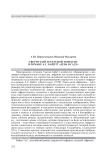
Свернутый и нулевой экфрасис в романе А.С. Байетт «Дева в саду»
Статья научная
Произведения Антонии Сьюзен Байетт изобилуют обращениями к шедеврам изобразительного искусства, экфрасис как художественный прием является характерным для творчества английской писательницы. Данная статья посвящена исследованию функционирования свернутого и нулевого экфрасиса в романе А.С. Байетт «Дева в саду» (1978). Такого рода экфрасисы – краткие упоминания произведения изобразительного искусства – не предполагают развернутой репрезентации артефакта, описания его сюжета, композиции и художественных особенностей, однако анализ текста демонстрирует тесную связь экфрастических элементов с организацией художественного пространства, структурой конфликтов и системой персонажей. Свернутый и нулевой экфрасис реализуется в романе «Дева в саду» с помощью различных способов и приемов: прямого сравнения, метафоры, символизации. Описания внешности героя могут быть основаны на сравнении с визуальным изображением. Многочисленные копии и репродукции живописных, графических и скульптурных произведений фигурируют в описаниях интерьеров, характеризуя образы связанных с этими интерьерами действующих лиц романа. Автор апеллирует не только к сюжету и стилистике произведений искусства, но и к биографии художника, этапам творческого пути, культурно-историческому контексту. Ключевое событие романа, организующее повествование и объединяющее героев – постановка драмы «Астрея», которая происходит на фоне исторического события – подготовки к коронации Елизаветы II. Существенна роль экфрастических элементов в создании связи между эпохой Елизаветы I, которой посвящена пьеса одного из главных героев Александра Уэддерберна, и серединой ХХ в. С помощью кратких описаний или упоминаний произведений изобразительного искусства А.С. Байетт значительно расширяет границы текста за счет ассоциативного ряда, возникающего в сознании читателя.
Бесплатно

Светские хроники Марселя Пруста
Статья научная
В статье рассматривается та часть творческого наследия французского писателя Марселя Пруста (1871-1922), которая до сих пор не становилась предметом научного изучения: светские хроники. Показана связь жанра с искусством светской беседы, с одной стороны, и с журналистской практикой Пруста - с другой. Выявлены «первоэлементы» жанра: салонный портрет XVII в., мемуары Сен-Симона, нравоописательные очерки, парижская хроника, газетные заметки-отчеты о светских мероприятиях. Светские хроники Пруста рассмотрены в контексте нравоописательных очерков, принадлежавших перу предшественников Пруста, французских писателей XIX в. (Виктора де Жуи, Балиссона де Ружмона, Поль де Кока, Дельфины де Жирарден), а также хроник, которые писали для парижских периодических изданий крупные французские писателя рубежа XIX-XX вв. (Мопассан, Франс, Баррес и др.). Вместе с тем выявлены черты, отличающие светские хроники Пруста как от нравоописательных очерков, так и от газетных хроник его предшественников. Описаны важнейшие особенности светских хроник Пруста: сфокусированность на описании светских салонов, структурный лаконизм и камерность, мемуарный характер, наличие «curriculum hotes» (перечня гостей), «марионеточность» образов, комплиментарность. Показана связь светских хроник со сборником Пруста «Утехи и дни» (1896) и представленной в нем концепцией светскости как некой универсальной сущности. Сделан вывод о месте светских хроник в творчестве Пруста, которые служили подготовительными материалами и прологом к его роману «В поисках утраченного времени». В статье в переводе ее автора приводится не публиковавшаяся ранее на русском языке хроника Пруста «В свете».
Бесплатно

Семантика "нео -" в немецкой литературе рубежа XIX-XX вв
Статья научная
На рубеже XIX-ХХ вв. в литературе Германии зарождаются главные тенденции, определившие специфику литературного развития в последующие десятилетия. Одним из факторов, обусловивших его историческую конфигурацию, стали дихотомические отношения литературы конвенционального, традиционного типа и литературы модернистской. С противоборством двух парадигм художественного сознания и связан главным образом вектор литературного развития в Германии ХХ в. Новая литература, заявившая о себе в начале 1880х гг., была направлена против лишенной актуальности и художественной новизны массовой литературы эпохи грюндерства. «Новое» рождалось не только в отталкивании от старого и отжившего, но и в противоборстве соперничающих между собой стилей и направлений тех лет. Главная особенность немецкого литературного процесса конца XIX - начала XX в. - разновекторное сочетание компонентов художественной системы, проявившее себя в чрезвычайной неоднородности ее структуры, в причудливом соединении эстетических новшеств с переосмысленным опытом прошлых эпох. В статье предпринята попытка выявить семантические признаки «обновленческого» характера немецкой литературы на рубеже XIX-XX вв., развивавшейся в условиях формирования художественно-эстетического вектора модернизма.
Бесплатно

